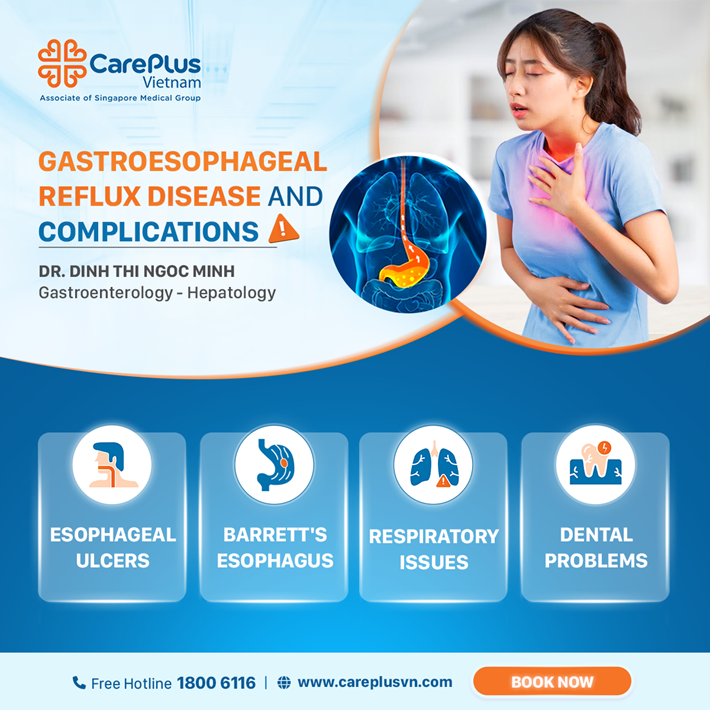GASTROESOPHAGEAL REFLUX DISEASE AND COMPLICATIONS
Gastroesophageal reflux disease (GERD) is a common digestive disease in Vietnam. However, most patients only seek medical checkups after enduring symptoms for a long time, leading to a high risk of recurrence and dangerous complications.

5/2/2024 4:06:37 PM
Gastroesophageal reflux disease (GERD) is a prevalent digestive disease in Vietnam. According to the Ministry of Health's report in 2022, 30-45% of urban patients have issues with the stomach and gastroesophageal reflux. However, most patients only seek medical checkups after enduring symptoms or self-medicating for a long time. So what are gastroesophageal reflux disease and its complications?
GASTROESOPHAGEAL REFLUX DISEASE
Reflux is the phenomenon where stomach acid and contents flow backwards into the esophagus (a normal tube that transports food from the mouth to the stomach for digestion). When this phenomenon causes discomfort or damages the esophagus, it is referred to as gastroesophageal reflux disease (GERD).
GERD has typical symptoms such as heartburn, acid regurgitation, belching,... and atypical symptoms like upper abdominal pain, difficulty swallowing, throat clearing, hoarseness, prolonged cough, nausea, or vomiting. This makes GERD easily confused with other gastrointestinal disorders.
Infact, GERD often takes a long time to heal and has a high recurrence rate, mainly due to daily habits and unhealthy lifestyles exacerbating the condition.
IMPORTANT COMPLICATIONS
Most GERD patients only experience discomfort symptoms like belching, acid regurgitation, bloating, ... and fewer severe complications. However, this also leads to a complacent attitude among patients, neglecting timely and definitive treatment, resulting in the disease progressing to a chronic stage, increasing the risk of developing more dangerous complications.
🔹 Esophageal ulcer: Regular reflux of stomach contents into the esophagus can damage the esophageal mucosa, causing ulcers. Prolonged esophageal inflammation can lead to fibrosis and esophageal strictures.
🔹 Barrett's esophagus: This is a condition where normal squamous epithelial cells in the lower esophagus transform into a different type of cell (intestinal cells) due to prolonged inflammation and ulceration. This transformation increases the risk of esophageal cancer in the future.
🔹 Respiratory Issues: Acid reflux from the stomach can cause inflammation of the laryngopharynx, throat pain, and hoarseness. Inhaling this acid reflux can also cause pneumonia, bronchial asthma. In rare cases, long-term acid exposure to the lungs can lead to chronic lung damage.
🔹Dental Problems: Long-term acid exposure may damage tooth enamel, leading to dental decay.
ESOPHAGEAL CANCER
According to GLOBOCAN statistics in 2022, there were approximately 511,054 new cases and 445,391 deaths from esophageal cancer worldwide. In Vietnam, esophageal cancer ranks 12th among common cancers, with 3,686 new cases and 3,470 deaths annually, with the typical age range of 50 - 60 years. The leading risk factors for esophageal cancer include long-term alcohol and tobacco use and frequent consumption of hot foods (above 60°C). When GERD persists, patients may develop Barrett's esophagus, increasing the risk of esophageal cancer. However, not all GERD patients face this risk.
Common risk factors for Barrett's esophagus include middle-aged men (typically around 55 years old), smoking, obesity, and a family history of Barrett's esophagus or esophageal cancer.
Barrett's esophagus has a risk of progressing to esophageal cancer, but this risk is very low, only about 0.5% per year. Therefore, we should not overly worry when diagnosed with Barrett's esophagus.
When experiencing symptoms or signs of gastroesophageal reflux and suspecting Barrett's esophagus, proactive medical consultation at CarePlus with a Gastroenterologist is advised for proper diagnosis, monitoring, and treatment tailored to each case:
🔸 Use medications to improve and reduce GERD symptoms, combined with lifestyle changes to prevent complications.
🔸 Patients with Barrett's esophagus but no suspected pre-cancerous changes only need to undergo endoscopy every 3-5 years for monitoring.
🔸 If patients with Barrett's esophagus have suspected pre-cancerous lesions, they will receive treatment according to the severity and have closer monitoring every 6 months to 1 year depending on actual symptoms.